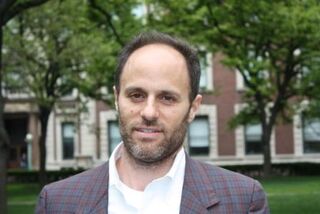Health
COVID-19's Heterogenous Mental Health Consequences
An interview with Dr. Anthony Mancini on mental health variation and effects.
Posted September 15, 2020

COVID-19 has affected everyone, but even these effects will be variable across individuals, contexts, and time. Dr. Anthony Mancini shares some of his thoughts on this based on his commentary.
Anthony D. Mancini, Ph.D., Associate Professor, Pace University, heads the Trauma, Social Processes, and Resilience Lab and is a clinical psychologist who studies adaptation to acute stressors. His most recent theoretical and empirical work focuses on the ways acute adversity can result in improved psychosocial functioning (“psychosocial gains from adversity”). He has published over 50 journal articles and book chapters on the complex effects of stress on human functioning and the role of social factors in stress adaptation.
Jamie Aten: How would you personally define heterogeneous mental health consequences?
Anthony Mancini: Heterogeneous mental health consequences just means that people are going to respond in widely varying ways. This is always, incidentally, the case with acute stress, so we should expect a lot of variation in response to COVID-19. We’ll see variation over time, we’ll see it among different kinds of people, and we’ll see it under different circumstances. It’s critical to recognize that everything we know about the stress response tells us that we cannot make global characterizations about the pandemic’s mental health effects.
For most people, the pandemic will have little effect to no effect on their psychological functioning. However, others may be substantially affected, suffering from depressed mood, anxiety about the future, and feelings of isolation, not to mention specific fears about infection or contamination. Still others may see minor fluctuations over time, doing better and worse, while still others will show improved functioning.
JA: What are some ways understanding the heterogeneity of COVID-19 mental health consequences can help us live more resiliently?
AM: An understanding of heterogeneity can help us to live more resiliently by simply recognizing it. We should expect more variability in our mood under stress, more ups and downs. Just anticipating this can help us not to layer additional stress by worrying that we’re not coping well.
JA: What are some ways people can cultivate resilience amidst this pandemic?
AM: There’s little to no doubt that the quality and availability of social interaction, whether virtual or in-person, is absolutely essential. Just thinking about the people that we care about can help, so it’s not always the case that we need to see people in person. Whatever the case, we know that social factors are critical in the context of stress. We also know—and this is sometimes not properly understood—that stress impels us to affiliate with others, to “tend and befriend,” in Shelley Taylor’s memorable phrase. We should obey this impulse, as it is likely driven by evolutionarily driven coping mechanisms.
JA: Any advice for how we might use what you have learned to support a friend or loved one struggling with a difficult life situation?
AM: It’s usually not the magic words we say, but simply making the person aware that we’re around, we’re available to talk, and we’re thinking of them.
JA: What are you currently working on that you might like to share about?
AM: I am currently working on a book, a hybrid memoir that will use my own childhood experiences of adversity as a means of discussing the science of childhood adversity, especially the widespread misunderstandings about adversity. The book is consistent with my theoretical and empirical work that has found adversity can stimulate improved functioning in a variety of contexts. As mentioned above, I’ve summarized that thinking in a theory regarding individual differences in human stress responding and the factors associated with adaptation to acute stress.
References
Mancini, A. D. (2020). Heterogeneous mental health consequences of COVID-19: Costs and benefits. Psychological Trauma: Theory, Research, Practice, and Policy, 12(S1), S15-S16. http://dx.doi.org/10.1037/tra0000894


